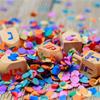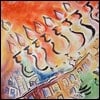From Bangkok to Brooklyn to the Brandenburg Gate, global menorah lightings reflected each region’s special flavor, but each issued a far-reaching, universal statement of tolerance, togetherness and unity.
“It’s in the true spirit of Judaism to bring light to the masses,” says Rabbi Danny Yiftach of Chabad-Lubavitch of Marina Del Rey, a seaside hamlet in Los Angeles County, where a first-night menorah kindling drew a crowd of 200 people. “Light represents freedom and is a beacon of inspiration.”
Festivities included a ventriloquist performance for children and a special perk in the way of a traveling kosher hot truck offering a variety of Israeli edibles, a treat for Jews in an area lacking its own kosher supermarket.
“We’re trying to establish a set schedule [for the truck] to make kosher food readily available to people in the neighborhood,” says Yiftach.
But it was the spontaneous dancing that broke out up and down Washington Boulevard, a main thoroughfare through town, which sparked a rousing reaction from passers-by.
“The traffic was jam-packed,” effuses Yiftach. “People that were walking by – Jews, non-Jews, everyone – parked their cars and came to join us. It was a superb event and very special for the people of Marina Del Rey.”
A Chanukah menorah lighting planned for Sunday on the front steps of Pasadena City Hall in Pasadena, Calif., has drawn community interest of a different sort. The theme of the outdoor event is “Tournament of Lights,” in keeping with the annual New Year’s Day Tournament of Roses Parade for which the city is famous.
The centerpiece of the latke and chocolate gelt-filled celebration – an estimated 300 are expected to attend – is a seven-foot menorah to be festooned with aromatic flowers.
“We’ve developed a relationship with the florist,” explains Chani Hanoka of the shop owner who donated the fragrant blooms. Her husband, Rabbi Chaim Hanoka has been purchasing Shabbat bouquets weekly from the non-Jewish proprietor for the past fifteen years.
“When you have a man who is not Jewish donating so many beautiful flowers for Chanukah,” continues Hanoka, co-director of the local Chabad House, “it becomes a real community event.”
Many cities have organized grand, bedecked parades to celebrate the Festival of Lights. On Wednesday night, Chabad of Augusta, Maine, held its inaugural Chanukah procession, and on Thursday, Chabad of Hawaii sent a caravan of menorah-adorned cars through the tree-lined streets of Honolulu. (All told, more than 15,000 events in 75 countries will take place before the end of the holiday. To locate one near you, click here.)
Chabad of Palm Beach Gardens, Fla, meanwhile, held its first parade on the second night of Chanukah, local residents driving some 40 vehicles affixed with wooden, three-feet-tall menorahs down PGA Boulevard during rush hour traffic.
“Many people are under the mistaken impression that Judaism is relevant only in the synagogues and Hebrew schools, but not for real life,” laments Rabbi Dovid Vigler. “We are out to change that notion. The Syrian Greeks tried to force the Jews to denounce G‑d. In an effort to reverse the assimilation attempts, we wear our colors proudly upon our cars for all to witness.”

Chanukah, Vigler points out, is a holiday wherein anybody, regardless of one’s religious affiliation, can revel in its joy and spirit as put forth by the symbol of the brightly sparked menorah.
“For many locals that might struggle with the wearing of a yarmule on a regular basis,” illustrates Vigler, “this is a real achievement in openly displaying their Jewish identity so proudly. There is a definite excitement and energy in the community.”
In such far-flung, tropical locales as Thailand – approximately 1,000 Jews reside in Bangkok – and Puerto Rico, with a Jewish population of around 2,000 people, public menorah lightings serve as an opportunity to pull Jewish individuals together.
“For the first time, the traditional Chanukah doughnuts known as sufganiyot will be made in Puerto Rico at Chabad’s kitchen,” says Rabbi Mendel Zarchi. “In years passed they were brought in from New York.”
At its menorah lighting on Monday, Chabad of Bangkok will put a Thai twist on traditional Chanukah fare.
“The food is spicier to cater to the local tastes,” says Rabbi Yosef Kantor, who anticipates a crowd of around 400.
But the main focus of Chanukah, affirms Rabbi Yosef Moscowitz of Chabad of Illinois, is on the candles lit each night, and their collective eternal plea of carving out hope no matter what the depths of despair.
“There’s a lot of doubt out there,” asserts Moscowitz, spearheading a Sunday parade in Chicago where a veritable fleet of 100 menorah-topped vehicles will zip along Lakeshore Drive.
“People are wondering whether things are going to get better or not,” he explains. “Strangers are seeing these [menorahs] and they are inspired. The message is getting out there. They suddenly feel enlightened. When everything looks bleak, every day we increase the light. No matter where you are, you increase the light every day, and that’s how you pull through.”









Start a Discussion